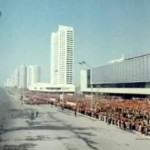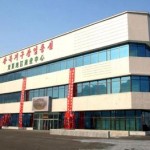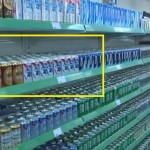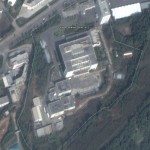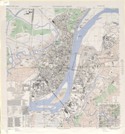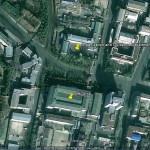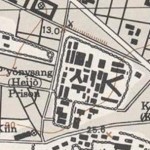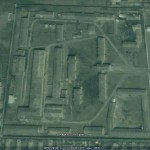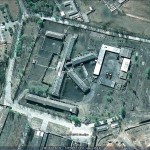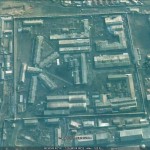UPDATE 4 (2/20/2011): Kim Tong-un (김동은) named Kim Jong-il’s fund manager. According to Yonhap:
A senior official of North Korea’s ruling party has been named to lead a special party bureau, code-named Office 38, that oversees coffers and raises slush funds for its leader Kim Jong-il and the ruling elites, a source on North Korea said Sunday.
Kim Tong-un, formerly head of Office 39 in the Workers’ Party of Korea, assumed the post in May last year, when North Korea revived Office 38, which was merged with Office 39 in 2009, the source said on condition of anonymity. Office 39 is believed to be another organ that governs a wide network of business operations both legal and illegal.
Both Offices 38 and 39 belong to the Secretariat of the Workers’ Party, which Kim Jong-il chairs, according to a diagram of the North’s power structure released by the Unification Ministry, which handles inter-Korean affairs. Last year, the ministry had only included Office 39 in a similar diagram.
In a meeting with reporters last week, a ministry official said Office 38 has been spun off from Office 39 and is now running on its own again. The official, who would speak only on the condition of anonymity citing the sensitive nature of his comments, described “a stream of information” that has come through since mid-2010.
Office 38 mainly oversees transactions involving foreign currency, hotels and trade, the official said, while Office 39, headed by Jon Il-chun, drives revenue by dealing in narcotics, arms, natural resources and others.
The North’s revival of Office 38 is interpreted as an effort to cover the increasing cost of leader Kim Jong-il’s ceding of power to his youngest son, Jong-un.
The story was also reported in Yonhap.
UPDATE 3: Here are links to the Ministry of Unification‘s English language organization charts of the North Korean leadership in which some of the changes mentioned below are listed (though not all): Workers’ Party, State Organs, Parties and Organizations
UPDATE (2/15/2011): According to the Daily NK:
The number of Special Departments under the Secretariat of the Chosun Workers’ Party has been increased from 18 to 20, a move that includes the revival of the No. 38 Department, which previously served as Kim Jong Il’s private bank vault, and the foundation of a film department.
The Ministry of Unification revealed the news yesterday in its 2011 North Korean Power Structure and Index of Figures, Agencies and Organizations. It incorporates North Korean changes from December, 2009 up to the present day, completed after consultation with relevant agencies and experts.
The revival of the No. 38 Department and founding of a film department
The report states, “The No. 38 Department, which was merged with the No. 39 Department in 2009, was spun off again last year. Kang Neung Su, who was appointed Deputy Prime Minister in June of 2010, was introduced as head of the film department at the same time. The exact foundation date of the film department is unknown; however, it appears to be newly established.”
No. 38 and No. 39 Departments are directly controlled by Kim Jong Il and serve as a private vault for his ruling funds. The No. 38 Department manages hotels, foreign currency stores and restaurants etc, while illegal weapons trading through foreign trade companies, the smuggling of gold, illegal trade in drugs and the distribution of counterfeit dollars, so-called supernotes, are handled by the No. 39 Department.
“They combined two offices which had different functions, and it appears that this did not result in the intended efficiency,” a knowledgeable source commented.
Meanwhile, on the establishment of a film department, the source added, “North Korea’s cultural art is a political means by which to carry out Party policy and a policy tool to implant policy in the North Korean citizens.”
Among the reshuffled special departments, the existing ‘Munitions Industry Department’ has been renamed the ‘Machine Industry Department’, and the ‘Administration and Capital Construction Department’ has been scaled back to simply ‘Administration Department’.
Elsewhere, the existing National Resources Development and Guidance Department under the Ministry of Extractive Industries has been promoted to National Resources Development Council and, as reported, the Joint Investment Guidance Department rose to become the Joint Investment Committee, while the National Price Establishment Department became the National Price Establishment Committee. Again, as reported, the ‘People’s Safety Agency’ under the Cabinet became the People’s Safety Ministry under the National Defense Commission, while the Capital Construction Department was downsized to become the General Bureau of Capital Construction.
The Central Court and Central Prosecutors Office were also renamed the Supreme Court and Supreme Prosecutors Office respectively.
The Ministry of Unification report also notes that North Korea added Nampo City to its list of eleven cities and provinces, increasing the total number to twelve.
The newly designated Nampo City includes five former parts of South Pyongan Province; Gangseo, Daean, Oncheon, Yonggang, and Chollima districts. Previously, Nampo was under the direct control of the central government as part of South Pyongan Province proper.
At the same time, North Korea also transferred the existing Kangnam-gun, Joonghwa-gun, Sangwon-gun, and Seungho-district, all formerly southern sections of Pyongyang City, to North Hwanghae Province.
Military Commission placed under the Central Committee of the Party
The relationship of the Central Committee and Central Military Commission, which was formerly said to be in parallel, has been changed, reflecting the idea that the Military Commission is now under the Central Committee of the Party.
The Ministry of Unification commented, “By revising the Party regulations, the Central Military Commission and Central Committee were marked as parallel in 2009 and 2010. However, after confirming the revised Party regulations at the Chosun Workers’ Party Delegates’ Conference on September 28th last year, this relationship was adjusted, and an election is now held for the Central Military Commission via a plenary session of the Central Committee.”
Also, the ‘Bureau of General Staff’ under the National Defense Commission was judged to be below the Ministry of the People’s Armed Forces, but is now shown to be in a parallel relationship with the Ministry of the People’s Armed Force and ‘General Political Department’.
ORIGINAL POST (2/14/2011): According to Yonhap:
North Korea has revived a special party bureau, codenamed Office 38, that oversees coffers and raises slush funds for its leader Kim Jong-il and the ruling elites, South Korea said Monday in its annual assessment of the power structure in the communist country.
In 2009, the bureau had been merged with Office 39, another organ that governs a wide network of business operations both legal and illegal, according to the Unification Ministry in Seoul.
In a meeting with reporters, however, a ministry official said Office 38 has been spun off from Office 39 and is now running on its own again. The official, who would speak only on the condition of anonymity citing the intelligence nature of his comments, cited “a stream of information” that has come through since mid-2010.
The official would not elaborate on how the information has been obtained, only saying the ministry works closely with “related government bodies” to outline the North’s power structure.
Office 38, whose chief remains unknown, mainly oversees transactions involving foreign currency, hotels and trade, the official said, while Office 39, headed by Jon Il-chun, drives revenue by dealing in narcotics, arms, natural resources and others.
A source privy to North Korea matters said the spin-off suggests that North Korea has been experiencing difficulties in earning foreign currency since merging the two offices.
“Efficiency was probably compromised after the two, which have different functions, were combined,” the source said, declining to be identified citing the speculative nature of the topic. “More importantly, it seems related to the current state of foreign currency stocks. The North is apparently trying to address those difficulties.”
In August last year, the United States blacklisted Office 39 as one of several North Korean entities to newly come under sanctions for involvement in illegal deeds such as currency counterfeiting.
North Korea is also believed to have been hit hard financially after South Korea imposed a series of economic penalties last year on Pyongyang when the sinking of a warship was blamed on it.
Both Offices 38 and 39 belong to the Secretariat of the Workers’ Party, which Kim Jong-il chairs, according to a diagram of the North’s power structure released by the Unification Ministry. Last year, the ministry had only included Office 39 in a similar diagram.
Both offices have often been referred to as Kim Jong-il’s “personal safes” for their role in raising and managing secret funds and procuring luxury goods for the aging leader.
Read the full story here:
North Korea Splits No. 38 and 39 Departments Up Again
Daily NK
Kim So Yeol
2/15/2011
N. Korea revives ‘Office 38’ managing Kim Jong-il’s funds: ministry
Yonhap
Sam Kim
2/14/2011

